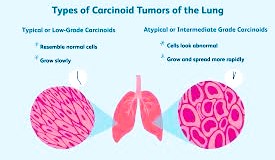Carcinoid Tumors of the Lung: Causes, Symptoms and Treatment
"Discover causes, symptoms, and effective treatments for carcinoid tumors of the lung. Explore comprehensive insights and management strategies." #Carcinoid Tumors


Carcinoid Tumors of the Lung:
Carcinoid tumors of the lung are a type of neuroendocrine tumor that develops in the cells of the lungs. These tumors are relatively rare, accounting for only a small percentage of lung cancers. In this blog post, we will explore the causes, symptoms, and treatment options for carcinoid tumors of the lung.
Causes
The exact cause of carcinoid tumors of the lung is unknown. However, research suggests that certain factors may increase the risk of developing these tumors. These factors include:
Genetic mutations: Some individuals may inherit genetic mutations that make them more susceptible to developing carcinoid tumors.
Exposure to carcinogens: Prolonged exposure to certain chemicals, such as radon or asbestos, may increase the risk of developing lung tumors.
Smoking: Although most carcinoid tumors of the lung are not directly linked to smoking, individuals who smoke are at a higher risk of developing lung cancer in general.
Symptoms
The symptoms of carcinoid tumors of the lung can vary depending on the size and location of the tumor. In many cases, these tumors grow slowly and may not cause noticeable symptoms in the early stages. However, as the tumor grows larger or spreads to other parts of the body, the following symptoms may occur:
Coughing, wheezing, or shortness of breath
Chest pain
Unexplained weight loss
Fatigue
Recurrent lung infections
Flushing of the skin
Diarrhea
Treatment
The treatment for carcinoid tumors of the lung depends on several factors, including the size and location of the tumor, as well as the overall health of the patient. The following treatment options may be considered:
Surgery: Surgical removal of the tumor is often the preferred treatment option, especially if the tumor is small and has not spread to other parts of the body.
Chemotherapy: In some cases, chemotherapy may be used to shrink the tumor before surgery or to treat tumors that have spread to other parts of the body.
Radiation therapy: Radiation therapy may be used to destroy cancer cells or relieve symptoms in cases where surgery is not possible.
Targeted therapy: Targeted therapy drugs may be used to block the growth of cancer cells or to destroy them.
It is important to note that the treatment approach may vary for each individual, and a multidisciplinary team of healthcare professionals will work together to determine the most appropriate treatment plan.
Conclusion
Carcinoid tumors of the lung are a rare form of lung cancer that can have varying symptoms and treatment options. While the exact cause of these tumors is unknown, certain risk factors, such as genetic mutations and exposure to carcinogens, may increase the likelihood of developing them. If you experience any symptoms associated with carcinoid tumors of the lung, it is important to consult with a healthcare professional for an accurate diagnosis and appropriate treatment.
